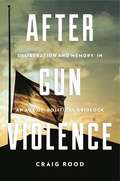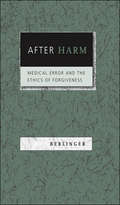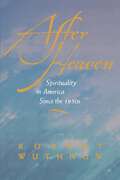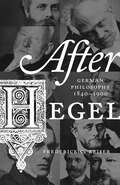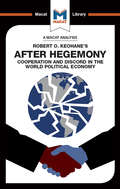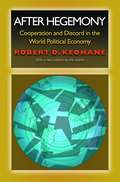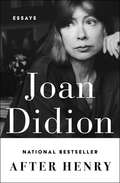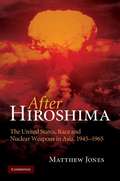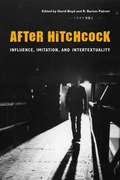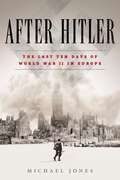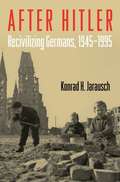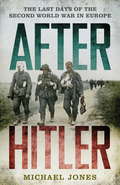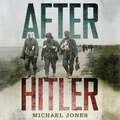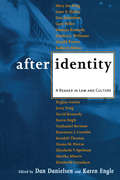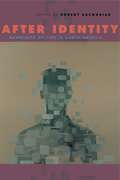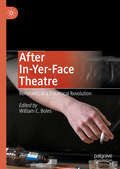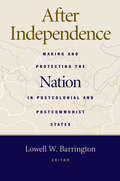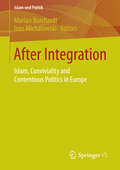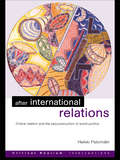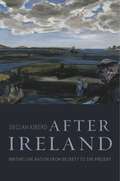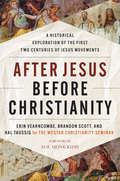- Table View
- List View
After Gun Violence: Deliberation and Memory in an Age of Political Gridlock (Rhetoric and Democratic Deliberation #21)
by Craig RoodMass shootings have become the “new normal” in American life. The same can be said for the public debate that follows a shooting: blame is cast, political postures are assumed, but no meaningful policy changes are enacted. In After Gun Violence, Craig Rood argues that this cycle is the result of a communication problem. Without advocating for specific policies, Rood examines how Americans talk about gun violence and suggests how we might discuss the issues more productively and move beyond our current, tragic impasse.Exploring the ways advocacy groups, community leaders, politicians, and everyday citizens talk about gun violence, Rood reveals how the gun debate is about far more than just guns. He details the role of public memory in shaping the discourse, showing how memories of the victims of gun violence, the Second Amendment, and race relations influence how gun policy is discussed. In doing so, Rood argues that forgetting and misremembering this history leads interest groups and public officials to entrenched positions and political failure and drives the public further apart.Timely and innovative, After Gun Violence advances our understanding of public discourse in an age of gridlock by illustrating how public deliberation and public memory shape and misshape one another. It is a search to understand why public discourse fails and how we can do better.
After Gun Violence: Deliberation and Memory in an Age of Political Gridlock (Rhetoric and Democratic Deliberation)
by Craig RoodMass shootings have become the “new normal” in American life. The same can be said for the public debate that follows a shooting: blame is cast, political postures are assumed, but no meaningful policy changes are enacted. In After Gun Violence, Craig Rood argues that this cycle is the result of a communication problem. Without advocating for specific policies, Rood examines how Americans talk about gun violence and suggests how we might discuss the issues more productively and move beyond our current, tragic impasse.Exploring the ways advocacy groups, community leaders, politicians, and everyday citizens talk about gun violence, Rood reveals how the gun debate is about far more than just guns. He details the role of public memory in shaping the discourse, showing how memories of the victims of gun violence, the Second Amendment, and race relations influence how gun policy is discussed. In doing so, Rood argues that forgetting and misremembering this history leads interest groups and public officials to entrenched positions and political failure and drives the public further apart.Timely and innovative, After Gun Violence advances our understanding of public discourse in an age of gridlock by illustrating how public deliberation and public memory shape and misshape one another. It is a search to understand why public discourse fails and how we can do better.
After Harm: Medical Error and the Ethics of Forgiveness
by Nancy BerlingerMedical error is a leading problem of health care in the United States. Each year, more patients die as a result of medical mistakes than are killed by motor vehicle accidents, breast cancer, or AIDS. While most government and regulatory efforts are directed toward reducing and preventing errors, the actions that should follow the injury or death of a patient are still hotly debated. According to Nancy Berlinger, conversations on patient safety are missing several important components: religious voices, traditions, and models. In After Harm, Berlinger draws on sources in theology, ethics, religion, and culture to create a practical and comprehensive approach to addressing the needs of patients, families, and clinicians affected by medical error. She emphasizes the importance of acknowledging fallibility, telling the truth, confronting feelings of guilt and shame, and providing just compensation. After Harm adds important human dimensions to an issue that has profound consequences for patients and health care providers.
After Heaven: Spirituality in America Since the 1950s
by Robert WuthnowThe evolution of American spirituality over the past fifty years is the subject of Robert Wuthnow's engrossing new book. Wuthnow uses in-depth interviews and a broad range of resource materials to show how Americans, from teenagers to senior citizens, define their spiritual journeys. His findings are a telling reflection of the changes in beliefs and lifestyles that have occurred throughout the United States in recent decades.Wuthnow reconstructs the social and cultural reasons for an emphasis on a spirituality of dwelling (houses of worship, denominations, neighborhoods) during the 1950s. Then in the 1960s a spirituality of seeking began to emerge, leading individuals to go beyond established religious institutions. In subsequent chapters Wuthnow examines attempts to reassert spiritual discipline, encounters with the sacred (such as angels and near-death experiences), and the development of the "inner self." His final chapter discusses a spirituality of practice, an alternative for people who are uncomfortable within a single religious community and who want more than a spirituality of endless seeking.The diversity of contemporary American spirituality comes through in the voices of the interviewees. Christians, Jews, Buddhists, Muslims, Hindus, and Native Americans are included, as are followers of occult practices, New Age religions, and other eclectic groups. Wuthnow also notes how politicized spirituality, evangelical movements, and resources such as Twelve-Step programs and mental health therapy influence definitions of religious life today.Wuthnow's landmark book, The Restructuring of American Religion (1988), documented the changes in institutional religion in the United States; now After Heaven explains the changes in personal spirituality that have come to shape our religious life. Moreover, it is a compelling and insightful guide to understanding American culture at century's end.
After Hegel: German Philosophy, 1840–1900
by Frederick C. BeiserHistories of German philosophy in the nineteenth century typically focus on its first half—when Hegel, idealism, and Romanticism dominated. By contrast, the remainder of the century, after Hegel's death, has been relatively neglected because it has been seen as a period of stagnation and decline. But Frederick Beiser argues that the second half of the century was in fact one of the most revolutionary periods in modern philosophy because the nature of philosophy itself was up for grabs and the very absence of certainty led to creativity and the start of a new era. In this innovative concise history of German philosophy from 1840 to 1900, Beiser focuses not on themes or individual thinkers but rather on the period’s five great debates: the identity crisis of philosophy, the materialism controversy, the methods and limits of history, the pessimism controversy, and the Ignorabimusstreit. Schopenhauer and Wilhelm Dilthey play important roles in these controversies but so do many neglected figures, including Ludwig Büchner, Eugen Dühring, Eduard von Hartmann, Julius Fraunstaedt, Hermann Lotze, Adolf Trendelenburg, and two women, Agnes Taubert and Olga Pluemacher, who have been completely forgotten in histories of philosophy. The result is a wide-ranging, original, and surprising new account of German philosophy in the critical period between Hegel and the twentieth century.
After Hegemony
by Ramon Pacheco PardoRobert O. Keohane’s After Hegemony is both a classic of international relations scholarship and an example of how creative thinking can help shed new light on the world. Since the end of World War II, the global political landscape had been dominated by two superpowers, the USA and the USSR, and the tense stand-off of the Cold War. But, as the Cold War began to thaw, it became clear that a new global model might emerge. The commonly held belief amongst those studying international relations was that it was impossible for nations to work together without the influence of a hegemon (a dominant international power) to act as both referee and ultimate decision-maker. This paradigm – neorealism – worked on the basis that every nation will do all it can to maximize its power, with such processes only checked by a balance of competing powers. Keohane, however, examined the evidence afresh and came up with novel explanations for what was likely to come next. He went outside the dominant paradigm, and argued for what came to be known as the neoliberal conception of international politics. States, Keohane said, can and will cooperate without the influence of a hegemonic power, so long as doing so brings them absolute gains in the shape of economic and cultural benefits. In Keohane’s highly-creative view, the pursuit of national self-interest leads naturally to international cooperation – and to the formation of global regimes (such as the United Nations) that can reinforce and foster it.
After Hegemony: Cooperation and Discord in the World Political Economy
by Robert O. KeohaneThis book is a comprehensive study of cooperation among the advanced capitalist countries. Can cooperation persist without the dominance of a single power, such as the United States after World War II? To answer this pressing question, Robert Keohane analyzes the institutions, or "international regimes," through which cooperation has taken place in the world political economy and describes the evolution of these regimes as American hegemony has eroded. Refuting the idea that the decline of hegemony makes cooperation impossible, he views international regimes not as weak substitutes for world government but as devices for facilitating decentralized cooperation among egoistic actors. In the preface the author addresses the issue of cooperation after the end of the Soviet empire and with the renewed dominance of the United States, in security matters, as well as recent scholarship on cooperation.
After Henry: Essays
by Joan DidionIncisive essays on Patty Hearst and Reagan, the Central Park jogger and the Santa Ana winds, from the New York Times–bestselling author of South and West. In these eleven essays covering the national scene from Washington, DC; California; and New York, the acclaimed author of Slouching Towards Bethlehem and The White Album &“capture[s] the mood of America&” and confirms her reputation as one of our sharpest and most trustworthy cultural observers (The New York Times). Whether dissecting the 1988 presidential campaign, exploring the commercialization of a Hollywood murder, or reporting on the &“sideshows&” of foreign wars, Joan Didion proves that she is one of the premier essayists of the twentieth century, &“an articulate witness to the most stubborn and intractable truths of our time&” (Joyce Carol Oates, The New York Times Book Review). Highlights include &“In the Realm of the Fisher King,&” a portrait of the White House under the stewardship of Ronald and Nancy Reagan, two &“actors on location;&” and &“Girl of the Golden West,&” a meditation on the Patty Hearst case that draws an unexpected and insightful parallel between the kidnapped heiress and the emigrants who settled California. &“Sentimental Journeys&” is a deeply felt study of New York media coverage of the brutal rape of a white investment banker in Central Park, a notorious crime that exposed the city&’s racial and class fault lines. Dedicated to Henry Robbins, Didion&’s friend and editor from 1966 until his death in 1979, After Henry is an indispensable collection of &“superior reporting and criticism&” from a writer on whom we have relied for more than fifty years &“to get the story straight&” (Los Angeles Times).
After Hiroshima
by Matthew JonesBy emphasising the role of nuclear issues, After Hiroshima provides a new history of American policy in Asia between the dropping of the atomic bombs on Japan and the escalation of the Vietnam War. Drawing on a wide range of documentary evidence, Matthew Jones charts the development of American nuclear strategy and the foreign policy problems it raised, as the United States both confronted China and attempted to win the friendship of an Asia emerging from colonial domination. In underlining American perceptions that Asian peoples saw the possible repeat use of nuclear weapons as a manifestation of Western attitudes of 'white superiority', he offers new insights into the links between racial sensitivities and the conduct of US policy, and a fresh interpretation of the transition in American strategy from massive retaliation to flexible response in the era spanned by the Korean and Vietnam Wars.
After Hitchcock: Influence, Imitation, and Intertextuality
by Palmer David Boyd R. BartonAlfred Hitchcock is arguably the most famous director to have ever made a film. Almost single-handedly he turned the suspense thriller into one of the most popular film genres of all time, while his Psycho updated the horror film and inspired two generations of directors to imitate and adapt this most Hitchcockian of movies. Yet while much scholarly and popular attention has focused on the director's oeuvre, until now there has been no extensive study of how Alfred Hitchcock's films and methods have affected and transformed the history of the film medium. In this book, thirteen original essays by leading film scholars reveal the richness and variety of Alfred Hitchcock's legacy as they trace his shaping influence on particular films, filmmakers, genres, and even on film criticism. Some essays concentrate on films that imitate Hitchcock in diverse ways, including the movies of Brian de Palma and thrillers such as True Lies, The Silence of the Lambs, and Dead Again. Other essays look at genres that have been influenced by Hitchcock's work, including the 1970s paranoid thriller, the Italian giallo film, and the post-Psycho horror film. The remaining essays investigate developments within film culture and academic film study, including the enthusiasm of French New Wave filmmakers for Hitchcock's work, his influence on the filmic representation of violence in the post-studio Hollywood era, and the ways in which his films have become central texts for film theorists.
After Hitler
by Michael JonesFrom the acclaimed author of The King's Mother and Bosworth 1485--a fascinating look at ten days that changed the course of history...With the world at war, ten days can feel like a lifetime.... On April 30, 1945, Adolf Hitler committed suicide in a bunker in Berlin. But victory over the Nazi regime was not celebrated in western Europe until May 8, and in Russia a day later, on the ninth. Why did a peace agreement take so much time? How did this brutal, protracted conflict coalesce into its unlikely endgame? After Hitler shines a light on ten fascinating days after that infamous suicide that changed the course of the twentieth century. Combining exhaustive research with masterfully paced storytelling, Michael Jones recounts the Führer's frantic last stand; the devious maneuverings of his handpicked successor, Karl Dönitz; the grudging respect Joseph Stalin had for Churchill and FDR, as well as his distrust of Harry Truman; the bold negotiating by General Dwight D. Eisenhower that hastened Germany's surrender but drew the ire of the Kremlin; the journalist who almost scuttled the cease-fire; and the thousands of ordinary British, American, and Russian soldiers caught in the swells of history, from the Red Army's march on Berlin to the liberation of the Nazis' remaining concentration camps. Through it all, Jones traces the shifting loyalties between East and West that sowed the seeds of the Cold War and nearly unraveled the Grand Alliance. In this gripping, eloquent, and even-handed narrative, the spring of 1945 comes alive--a fascinating time when nothing was certain, and every second mattered....INCLUDES PHOTOSFrom the Hardcover edition.
After Hitler: Recivilizing Germans, 1945-1995
by Konrad H. Jarausch Konrad HunzikerIn the spring of 1945, as the German army fell in defeat and the world first learned of the unspeakable crimes of the Holocaust, few would have expected that, only half a century later, the Germans would emerge as a prosperous people at the forefront of peaceful European integration. How did the Germans manage to recover from the shattering experience of defeat in World War II and rehabilitate themselves from the shame and horror of the Holocaust? In After Hitler, Konrad H. Jarausch shows how Germany's determination to emphasize civility and civil society, destroyed by the Nazi regime,helped restore the demoralized nation during the post-war period. Unlike other intellectual inquiries into German efforts to deal with the Nazi past, After Hitler primarily focuses on the practical lessons a disoriented people drew from their past misdeeds, and their struggle to create a new society with a sincere and deep commitment to human rights. After Hitler offers a comprehensive view of the breathtaking transformation of the Germans from the defeated Nazi accomplices and Holocaust perpetrators of 1945 to the civilized, democratic people of today's Germany.
After Hitler: The Last Days of the Second World War in Europe
by Michael JonesOn 30 April 1945, Adolf Hitler committed suicide. The following day, his propaganda minister Joseph Goebbels also killed himself and the crumbling Third Reich passed to Admiral Karl Dönitz. The Nazis' position seemed hopeless. Yet remarkably, the war in the rest of Europe went on for another ten days. After Hitler looks at these days as a narrative day-by-day countdown but also as a broader global history of a European war that had seen some of the most savage battles in history. Relations between the 'Big Three' - the United States, Great Britain and the Soviet Union - suddenly plunged to near breaking point. This book reveals that tumultuous story.After Hitler also looks at the wider canvas of the war and the terrible humanitarian catastrophe uncovered in Europe. It describes those who felt the joy of freedom, but also those who faced a highly uncertain future. As Red Army soldiers joined forces with their British and American allies, Stalin's East finally came face to face with Churchill's and Truman's West. After Hitler tells of their growing mistrust, but also of moments of remarkable goodwill and co-operation - the brief but poignant hope that these great nations could together fashion a new and safer future. This is a fascinating exploration of the brief but crucial period that shaped the emerging post-war world.
After Hitler: The Last Days of the Second World War in Europe
by Michael JonesOn 30 April 1945, Adolf Hitler committed suicide. The following day, his propaganda minister Joseph Goebbels also killed himself and the crumbling Third Reich passed to Admiral Karl Dönitz. The Nazis' position seemed hopeless. Yet remarkably, the war in the rest of Europe went on for another ten days. After Hitler looks at these days as a narrative day-by-day countdown but also as a broader global history of a European war that had seen some of the most savage battles in history. Relations between the 'Big Three' - the United States, Great Britain and the Soviet Union - suddenly plunged to near breaking point. This book reveals that tumultuous story.After Hitler also looks at the wider canvas of the war and the terrible humanitarian catastrophe uncovered in Europe. It describes those who felt the joy of freedom, but also those who faced a highly uncertain future. As Red Army soldiers joined forces with their British and American allies, Stalin's East finally came face to face with Churchill's and Truman's West. After Hitler tells of their growing mistrust, but also of moments of remarkable goodwill and co-operation - the brief but poignant hope that these great nations could together fashion a new and safer future. This is a fascinating exploration of the brief but crucial period that shaped the emerging post-war world.
After Hitler: The Last Days of the Second World War in Europe
by Michael JonesThe fascinating and little-known history of the last days of the Second World War in Europe.On 30 April 1945, Adolf Hitler committed suicide. The following day, his propaganda minister Joseph Goebbels also killed himself and the crumbling Third Reich passed to Admiral Karl Dönitz. The Nazis' position seemed hopeless. Yet remarkably, the war in the rest of Europe went on for another ten days. After Hitler looks at these days as a narrative day-by-day countdown but also as a broader global history of a European war that had seen some of the most savage battles in history. Relations between the 'Big Three' - the United States, Great Britain and the Soviet Union - suddenly plunged to near breaking point. This book reveals that tumultuous story.After Hitler also looks at the wider canvas of the war and the terrible humanitarian catastrophe uncovered in Europe. It describes those who felt the joy of freedom, but also those who faced a highly uncertain future. As Red Army soldiers joined forces with their British and American allies, Stalin's East finally came face to face with Churchill's and Truman's West. After Hitler tells of their growing mistrust, but also of moments of remarkable goodwill and co-operation - the brief but poignant hope that these great nations could together fashion a new and safer future. This is a fascinating exploration of the brief but crucial period that shaped the emerging post-war world.(P)2018 Hodder & Stoughton Limited
After Identity: A Reader in Law and Culture
by Karen Engle Dan DanielsenAuthored by the leading voices in critical legal studies, feminist legal theory, critical race theory and queer legal theory, After Identity explores the importance of sexual, national and other identities in people's lived experiences while simultaneously challenging the limits of legal strategies focused on traditional identity groups. These new ways of thinking about cultural identity have implications for strategies for legal reform, as well as for progressive thinking generally about theory, culture and politics.
After Identity: Mennonite Writing in North America
by Robert ZachariasFor decades, the field of Mennonite literature has been dominated by the question of Mennonite identity. After Identity interrogates this prolonged preoccupation and explores the potential to move beyond it to a truly post-identity Mennonite literature. The twelve essays collected here view Mennonite writing as transitioning beyond a tradition concerned primarily with defining itself and its cultural milieu. What this means for the future of Mennonite literature and its attendant criticism is the question at the heart of this volume. Contributors explore the histories and contexts—as well as the gaps—that have informed and diverted the perennial focus on identity in Mennonite literature, even as that identity is reread, reframed, and expanded.After Identity is a timely reappraisal of the Mennonite literature of Canada and the United States at the very moment when that literature seems ready to progress into a new era.In addition to the editor, the contributors are Ervin Beck, Di Brandt, Daniel Shank Cruz, Jeff Gundy, Ann Hostetler, Julia Spicher Kasdorf, Royden Loewen, Jesse Nathan, Magdalene Redekop, Hildi Froese Tiessen, and Paul Tiessen.
After Ideology: Recovering the Spiritual Foundations of Freedom
by David Walsh<p>The crises of the twentieth century - wars, genocide, the proliferation of atomic weapons, the rise and fall of communism, the breakup of the family - have shaken our faith in modernity and in the fundamental conceit upon which it is grounded: that human beings are capable of providing their own moral and political order. Ideologies based on this conceit have at their heart the revolt against God that has so characterized modern history, and these ideologies have failed us. <p>Walsh contends that the solution is to recover the spiritual foundations of freedom and order. To make his case, he draws lessons from the intellectual pilgrimages of four contemporary thinkers who overcame the modern spirit of revolt against God: Dostoevsky, Solzhenitsyn, Camus, and Voegelin. He shows how each confronted the full consequences of secular messianism and found within his own experience the means of overcoming it. In the process of mounting a critique of modernity and articulating the direction in which the alternative lies, the four recovered what is in essence philosophic Christianity. They show us that beyond nihilism, beyond the revolt against God, there is the existential rediscovery of transcendent truth. <p>Walsh believes liberal democracy is redeemable, but that its redemption hinges on our return to a proper understanding of human nature and to a spiritual foundation based on Christian principles. We must first recognize, however, that without God, without moral absolutes, without divine order, we can not resolve our worldwide modern crisis.</p>
After In-Yer-Face Theatre: Remnants of a Theatrical Revolution
by William C. BolesThis book revisits In-Yer-Face theatre, an explosive, energetic theatrical movement from the 1990s that introduced the world to playwrights Sarah Kane, Martin McDonagh, Mark Ravenhill, Jez Butterworth, and many others. Split into three sections the book re-examines the era, considers the movement’s influence on international theatre, and considers its lasting effects on contemporary British theatre. The first section offers new readings on works from that time period (Antony Neilson and Mark Ravenhill) as well as challenges myths created by the Royal Court Theatre about the its involvement with In-Yer-Face theatre. The second section discusses the influence of In-Yer-Face on Portuguese, Russian and Australian theater, while the final section discusses the legacy of In-Yer-Face writers as well as their influences on more recent playwrights, including chapters on Philip Ridley, Sarah Kane, Joe Penhall, Martin Crimp, Dennis Kelly, and Verbatim Drama.
After Independence: Making and Protecting the Nation in Postcolonial & Postcommunist States
by Lowell W. BarringtonThe majority of the existing work on nationalism has centered on its role in the creation of new states. After Independence breaks new ground by examining the changes to nationalism after independence in seven new states. This innovative volume challenges scholars and specialists to rethink conventional views of ethnic and civic nationalism and the division between primordial and constructivist understandings of national identity.
After Integration: Islam, Conviviality and Contentious Politics in Europe (Islam und Politik)
by Marian Burchardt Ines MichalowskiThe integration of Muslims into European societies is often seen as a major challenge that is yet to be confronted. This book, by contrast, starts from the observation that on legal, political and organizational levels integration has already taken place. It showcases the variety of theoretical approaches that scholars have developed to conceptualize Muslim life in Europe, and provides detailed empirical analysis of ten European countries. Demonstrating how Muslim life unfolds between conviviality and contentious politics, the contributors describe demographic developments, analyze legal controversies, and explore the action of government and state, Muslim communities and other civil society actors. Driving forces behind the integration of Islam are discussed in detail and compared across countries.
After International Relations: Critical Realism and the (Re)Construction of World Politics (Critical Realism: Interventions (Routledge Critical Realism))
by Heikki PatomäkiAfter International Relations articulates a systematic critical realist response to a quest for more emancipatory methodologies in International Relations. Heikki Patomäki here establishes a way out of the international relations problematic which has puzzled so many great thinkers and scholars for the last two hundred years. After International Relations shows how and why theories based on the international problematic have failed; articulates an alternative, critical realist research programme; and illustrates how this research programme can be put to work to enable better research and ethico-political practices.
After Ireland: Writing the Nation from Beckett to the Present
by Declan KiberdPolitical failures and globalization have eroded Ireland’s sovereignty—a decline portended in Irish literature. Surveying the bleak themes in thirty works by modern writers, Declan Kiberd finds audacious experimentation that embodies the defiance and resourcefulness of Ireland’s founding spirit—and a strange kind of hope for a more open nation.
After Jesus Before Christianity: A Historical Exploration of the First Two Centuries of Jesus Movements
by Hal Taussig Erin Vearncombe Brandon Scott Westar Institute, TheFrom the creative minds of the scholarly group behind the groundbreaking Jesus Seminar comes this provocative and eye-opening look at the roots of Christianity that offers a thoughtful reconsideration of the first two centuries of the Jesus movement, transforming our understanding of the religion and its early dissemination.Christianity has endured for more than two millennia and is practiced by billions worldwide today. Yet that longevity has created difficulties for scholars tracing the religion’s roots, distorting much of the historical investigation into the first two centuries of the Jesus movement. But what if Christianity died in the fourth or fifth centuries after it began? How would that change how historians see and understand its first two hundred years?Considering these questions, three Bible scholars from the Westar Institute summarize the work of the Christianity Seminar and its efforts to offer a new way of thinking about Christianity and its roots. Synthesizing the institute’s most recent scholarship—bringing together the many archaeological and textual discoveries over the last twenty years—they have found: There were multiple Jesus movements, not a singular one, before the fourth centuryThere was nothing called Christianity until the third centuryThere was much more flexibility and diversity within Jesus’s movement before it became centralized in Rome, not only regarding the Bible and religious doctrine, but also understandings of gender, sexuality and morality.Exciting and revolutionary, After Jesus Before Christianity provides fresh insights into the real history behind how the Jesus movement became Christianity. After Jesus Before Christianity includes more than a dozen black-and-white images throughout.
